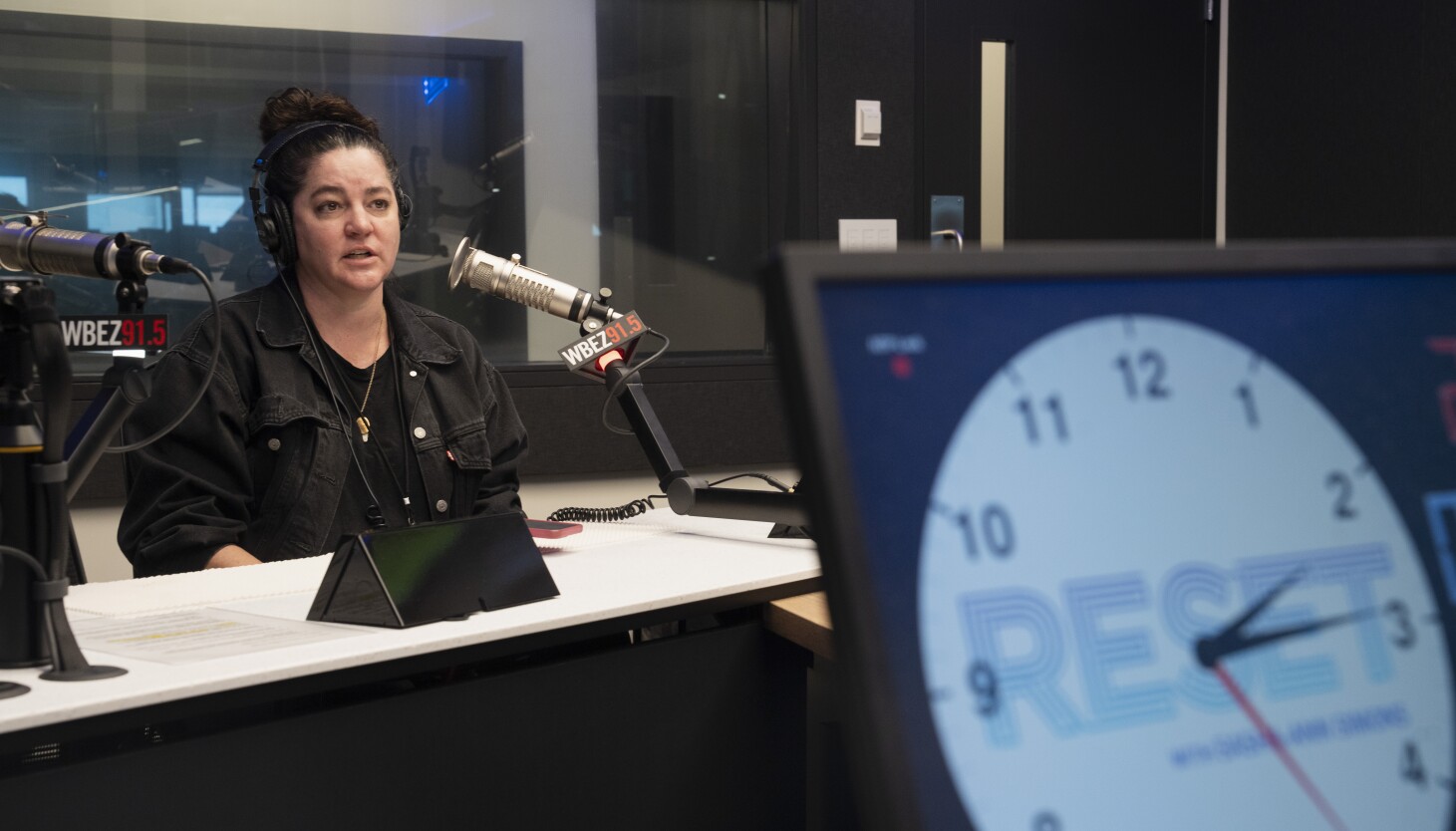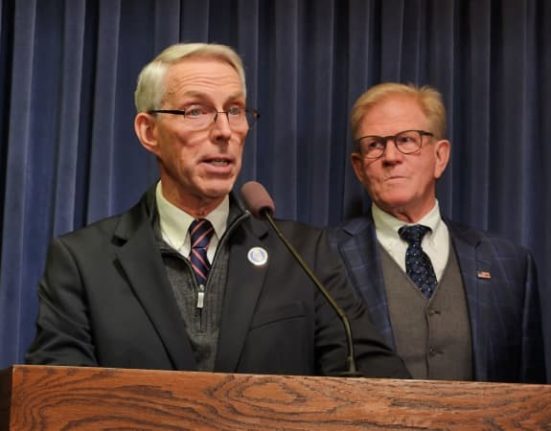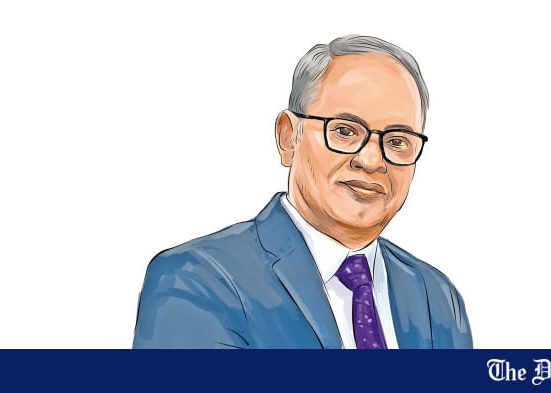The White House has submitted a rescissions package to Congress, asking them to eliminate more than a billion dollars in funding for the Corporation for Public Broadcasting, which funds NPR and PBS. This follows an executive order last month where President Donald Trump aimed to defund CPB, which is now facing lawsuits. Chicago Public Media CEO Melissa Bell joined WBEZ to discuss what this means for the organization.
Melba Lara is the longtime Chicago host of NPR’s All Things Considered on WBEZ. This interview was lightly edited for grammar and clarity.
How is this rescissions package different from the executive order President Donald Trump signed to defund the Corporation for Public Broadcasting?
Sure. It’s actually a much more troubling step forward. Congress essentially has 45 working days to decide whether or not they’re going to pass a rescission, which would mean that the funding is revoked for the following two years, 2026 and 2027. I want to be clear that it’s already been approved in the budget, and this is essentially an attempt to claw back that money. And the executive order was more of what I’d consider a press release from the president, saying that he had every intent to push against federal funding for public radio and public television. But now this could put it into law, and that’s very troubling.
What is the possibility of the rescissions package going through?
You know, it’s hard to say. I think that the fact that it’s been brought forward is a troubling step, that it could pass both the House and the Senate. There is hope, though, that there are folks that really understand the power and the impact and the need of a federally funded public broadcasting system. You know, for folks out there — obviously we love it, because it brings you the great shows from WBEZ and Chicago Public Media. But it’s more than just a radio show. It is our national emergency system. When you hear in major moments of crisis, emergencies — the more recent impact that happened in the Blue Ridge Mountains around the hurricane, people were being able to be reached because of the radio satellite system.
This threatens that, really threatens that. It also threatens the ability for news programming across many areas in our country that could otherwise be news deserts, that wouldn’t have local news. So, there’s a real threat here. So, there’s a possibility that some in the Senate may not want to revoke this federal funding. There’s a hope that those congresspeople may make the decision that this isn’t something that they can take out of their budget, because it will impact their populations in a very real way.
About 6% of the Chicago Public Media budget, or about $2 million, comes from CPB grants. If that money goes away, how will WBEZ be affected?
I started here in September, and even prior to my joining the organization, I knew that there was a possibility that a second Trump administration was a real possibility. And we knew that one of the areas that he really wanted to push back against was public media. And so, we’ve been planning for this for a long time.
My hope is that while this will impact us in a big way, we currently at Chicago Public Media are working very hard to find other paths for revenue, particularly thanks to so much of the support of listeners out there, so that we can continue to remain independent, even if we don’t have federal funding. This is going to be hard for us. It definitely will be. Two million is a big number. It doesn’t include probably another million dollars in services that we get from the CPB, like better negotiated rates for music licenses and other sundry items. But we feel that we have a path forward at Chicago Public Media, whether we have the federal funding in place or not.
It’ll be hard, but we have a path. What I really worry about is the landscape of the public radio stations and public television stations across the country that don’t have just a 6% part of their budget. It’s up to 60% in certain areas. And if the federal funding goes away, those stations will go out of existence. We’re going to see a pretty significant extinction of quality local reporting across the country if we lose this federal funding.
Earlier this year, about 35 employees took a buyout offered by Chicago Public Media, saving the company about $4.2 million. So now, if $2 million goes away, how much of a reduction in staff would be needed?
My hope is that we would not have to face any more reductions. That’s not guaranteed. I’ve said this since I started here: We will never know what the external pressures are on our budget. But I’m really hoping that we can spend this year working very hard to push forward on our revenue initiatives, to support us in a way where we don’t have to see further reduction in staff. Again, you never know what happens and what may come. We might see a major recession hit. We might see other external factors impact our business. But I really do feel strongly that we have a plan in place for this year that can show true momentum at Chicago Public Media.
Much of the criticism behind the proposed cuts is that public media is biased. How do you respond to that criticism?
I think there’s two answers to that. The first answer is that I think that there has been a very sustained campaign in this country to suggest that independent journalism is biased. This has been going on since Fox News came up with the tagline “Fair and Balanced,” suggesting that they were something other than independent. That the rest of independent journalism was doing something biased.
I think that that’s been exacerbated by the attacks from the president, calling us fake news, and I think that that’s really influenced this idea that there is bias in the news. I also do think that in the journalism industry, we need to take some responsibility to help people understand how we do our work, when we make mistakes, when we are potentially not checking our own personal biases. As reporters, you come to a story and you are going to bring with you the full experience of your life. And so we need to make sure that the reporting we do checks our own biases as we go through the story process. And I think we need to be much more upfront about that, and how we work very hard to reduce the bias in our story selection, in our source selection.
The more we can help people understand what happens behind the scenes and the value that we bring to the work, I think we will be able to help people understand that what we try to do every day in the news business is to understand the truth as best as we can understand it in this moment — and we’re going to constantly update you as we learn new information, new challenges, potentially new corrections to the story. And so, I think that there’s work that we have to do. The bigger problem, though, I think, is the propaganda campaign that has claimed this idea of fake news.







